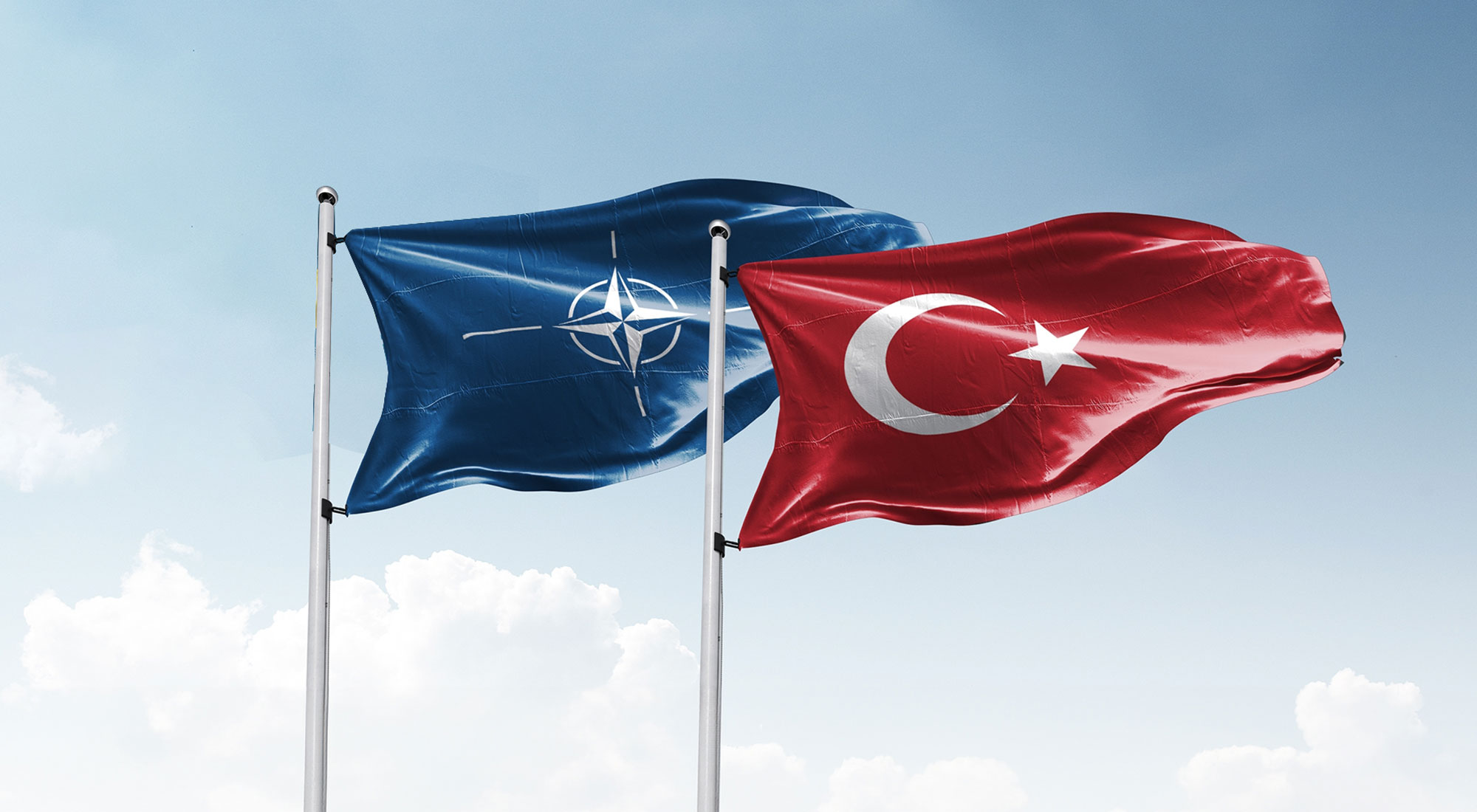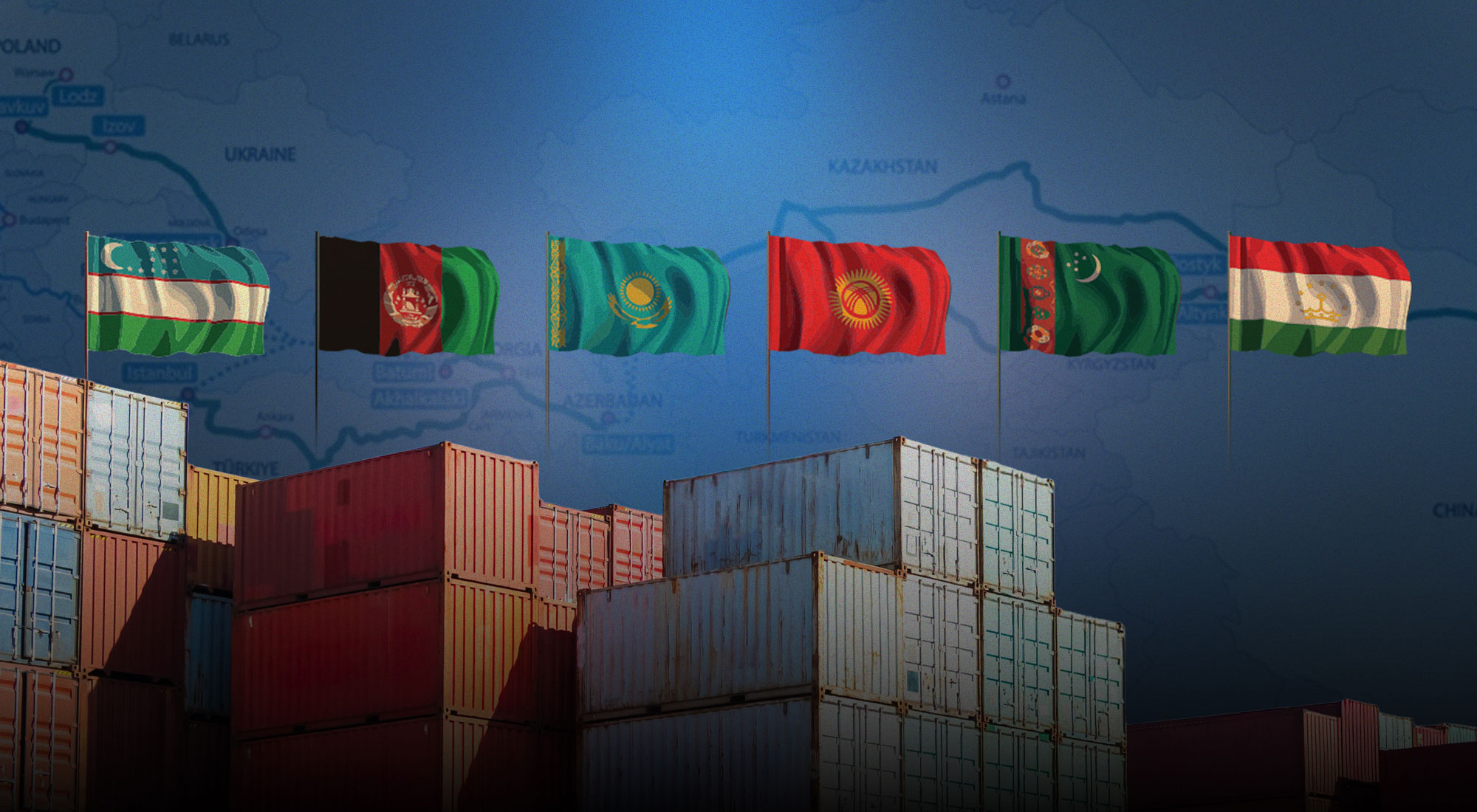Turkish President Recep Tayyip Erdoğan joined proceedings in Washington for the 75th anniversary of the establishment of the North Atlantic Treaty Organization (NATO). Türkiye has been a member of NATO since 1952, when the alliance moved to expand eastward with Türkiye and Greece joining the transatlantic fold. Since this period, membership in NATO has constituted one of Ankara’s key foreign policy tenets in the form of a shared military collective with the Western bloc. While Ankara’s integration into the European political and economic unions remains incomplete, with Türkiye holding candidacy negotiations with the European Union (EU) since 2004, its membership in NATO has remained steady and uncontested for the most part. This is indicative of the significance of NATO in Türkiye’s foreign policy formulation. Despite strong trends of autonomy in Türkiye’s foreign policy, with Ankara bidding for a regional role as an emergent middle power, Türkiye’s commitments to NATO have remained unchanged. Indeed, Ankara’s contribution to the alliance’s framework of peacekeeping and deterrence has also continually expanded as part of NATO’s post-Cold War mission.
Clearly, NATO remains relevant to Türkiye’s foreign policy at a critical stage for the alliance, which faces multifaceted threats from revisionist trends across the global stage. In the alliance’s latest joint declaration in Washington,[1] Russia and China were once again singled out as major challenges for the alliance. While NATO oversees active counter-Russian measures, a more ambivalent position is adopted on Beijing, referring to the spiraling competition between China and the Western world. The final document of the 75th-anniversary meeting also reaffirms the alliance’s commitment to Ukraine, noting that allies have collectively allocated over US$40 billion to the Kyiv government in support of the war with Russia. NATO oversees that such aid will continue unhindered, a prospect now challenged by the differing views espoused by Donald J. Trump and his running mate, J.D. Vance, in the U.S. presidential election this November.
NATO also foresees more cooperation with the EU on defense, a topic of interest for Türkiye. As a non-EU member of the alliance, Ankara’s position is somewhat unique, and the question of comprehensive European security is unthinkable without some role for Türkiye. While Türkiye-EU political dialogue looks unlikely to develop in the coming months, relations on the defense front, particularly considering NATO’s position of naming the EU a “unique and essential partner”, look promising. Ankara can be expected to play a pivotal role in the establishment of European defense, under the framework of NATO.
Türkiye’s position on these topics remains nuanced.[2] Ankara has for its part supported Ukraine’s membership in NATO but has also cautioned the alliance from getting entangled in a prolonged war with Russia.[3] Türkiye maintains strategic ties to both sides of the conflict, continuing to supply Ukraine with unmanned aerial vehicles (UAVs) and other military assets, as well as holding routine strategic talks with Russia. Ankara has made a significant purchase of Russian military technology, including the S-400 missile system, and has extensive security arrangements with Moscow that extend to Syria, Libya and other regions of conflict.
There are several questions for Ankara as the alliance leaves behind 75 years of existence. Foremost, Türkiye must assess whether its unique foreign and security policy positions, often at odds with key NATO member states, can be sought in unison with its membership in the transatlantic alliance. The second question is whether Ankara can pursue membership in Russian and Chinese-led international bodies, such as BRICS and the Shanghai Cooperation Organization (SCO), and still maintain its role as an active member of NATO. Lastly, the alliance’s future functioning format must be addressed by Türkiye, particularly as NATO moves to challenge Russia more proactively, engage in a doctrine of European defense, and position itself as a major player on the international stage.
Türkiye and NATO: Mismatch?
In an article, written by Türker Ertürk, a retired admiral of the Turkish Navy, after the transatlantic alliance issued its 75th-year joint declaration, he argues that a chasm exists between NATO and Türkiye’s security priorities.[4] The admiral accuses the U.S. of encircling Russia, dragging the alliance into conflict and seeking to rebuild NATO’s relevance through a protracted war in Ukraine. Ertürk notes that Iran, Russia and China, all countries of interest listed as rivals in NATO’s 75th-anniversary declaration, are not Türkiye’s enemies but are rather friendly nations that Ankara ought to expand ties with. Ertürk’s views are not necessarily fringe in the political arena of Türkiye. Indeed, scores of former defense personnel have outright argued the case that Türkiye should leave NATO and pursue its own independent path. Often labeled the nationalist/ulusalcı or sometimes “Eurasianist” camp in the Turkish military (as opposed to the so-called pro-U.S. and pro-NATO “Atlanticist” camp), these officers have instead promoted strategic level ties with Moscow, Beijing, and Central Asian Turkic republics rather than Washington and Brussels.
While these positions are certainly not government policy, Ankara’s evolving ties with Russia and China show that this rationale has somewhat penetrated into executive-level decision-making.[5] For instance, Turkish government officials have been openly calling for Ankara’s inclusion in BRICS. President Erdoğan recently attended the SCO leaders’ summit in Astana-Kazakhstan where he met with his Russian counterpart, Vladimir Putin. The president reiterated his position on Türkiye joining BRICS and the SCO, a point that was also made by foreign minister Hakan Fidan during his trip to China.
While BRICS in essence functions as a trading bloc, Ankara’s possible membership in a significant international body headed by Russia and China and co-joined by the likes of Iran would be met with heavy resistance in Western capitals. Indeed, Türkiye, as a NATO state, seeking membership in the BRICS would not only be unprecedented but could further the view in Washington that Ankara’s membership in the alliance should be open to debate. Likely, Ankara’s membership in the BRICS remains a slim prospect, given the extent of Türkiye’s economic and security integration with the Western bloc. However, the fact that the highest political officials in Türkiye are arguing for membership signifies the high level of nuance in Türkiye’s current foreign policy priorities.
On strategic ties with Russia,[6] similar trends can be noticed. Before the war in Ukraine, several EU member states, which were also NATO members, enjoyed close links with Moscow on select policy files such as energy and food. Now, the EU’s bloc-wide position of isolating Russia, complemented by NATO’s doctrine of deterrence, has rendered such relationships, for the most part, void. Out of all NATO member states, Türkiye and Hungary are the only two maintaining high-level diplomatic engagement with Moscow. This has also established both countries as contenders for negotiating a lasting political settlement to the conflict and, if not at the very least, a comprehensive ceasefire.
Türkiye’s relationship with Russia is not influenced by NATO’s strategic steering of a common European and transatlantic policy. Ankara has chosen to define its own relationship with Moscow, building on perceived crucial national security interests that require a working relationship with the Kremlin. This is evident most acutely in Syria, where Ankara essentially feels the most policy mismatch with its NATO allies, notably the U.S. and France, both of which actively support the Kurdish element (YPG) of the Syrian Democratic Forces (SDF). Ankara maintains that the YPG is no different than that of the PKK, the group that has waged an insurgency in Türkiye’s southeast region for several decades and is recognized as a terrorist organization by the U.S. and EU.
Ankara’s growing ties to Beijing also appear unaffected by NATO policy, or even the U.S., for that matter. Türkiye is a member of the China-led Belt and Road Initiative (BRI) and boasts extensive Chinese investment, particularly in the infrastructure sector. Foreign Minister Hakan Fidan[7] recently completed an extensive tour in China in the hopes of furthering such strategic ties. Fidan notably criticized the U.S.-led global order during his trip, praising multipolarity and likening China’s soft revisionism in the international system to Türkiye’s own quest for autonomy.
Türkiye and NATO’s Future
For all the perceived mismatch between Türkiye and NATO,[8] Ankara remains committed to the alliance and continues to benefit from membership in the Western bloc’s single most pivotal security organization. NATO membership ensures Türkiye’s significance for the U.S., a position that has been challenged persistently due to differing views on several issues between Ankara and Washington. Regardless of these challenges, Türkiye-U.S. ties have endured and have largely overcome moments of policy mismatch. Indeed, the Biden administration’s approval of an F-16 procurement agreement valued at over US$23 billion was the most significant indication of Washington’s desire to keep Ankara tethered to the transatlantic alliance.[9]
Türkiye’s ascribed value to NATO, as the alliance’s easternmost flank and access point to the Middle East, is paralleled in NATO’s value for Ankara. NATO has emerged as an international forum where Türkiye can project power. Ankara can influence the alliance’s priorities and decisions. This was most evident in last year’s spiraling crisis, with Türkiye blocking Swedish membership in NATO due to the country’s lax attitude toward the Kurdish separatist movement within its borders. The crisis was eventually solved, with Türkiye having influenced domestic legislative change in Sweden on the topic and having showcased its bargaining power against major pressure from the alliance and the United States. The episode was an opportunity for Ankara to bring its security concerns to the forefront.
NATO is also a significant enabler of Türkiye’s homegrown defense industry. NATO states such as Poland and Romania are clients of Türkiye’s successful UAV program, operating the popular TB-2 Bayraktar units produced by Baykar Industries, which is owned by President Erdoğan’s son-in-law, Selçuk Bayraktar. Several other NATO member states, particularly in Eastern Europe and the Balkans, have expressed interest in purchasing Turkish-made UAVs. NATO provides an unparalleled and sophisticated potential market for Turkish defense goods, with the alliance prioritizing the interoperability of military equipment. Türkiye’s exports to third countries are also significant as they are sourced from a NATO member state, adding a level of competence and value to the Turkish defense market that otherwise would have been difficult to attain. To that point, Türkiye is also cooperating with NATO allies on significant joint defense ventures. The UK’s BAE Systems and Turkish Aerospace Industries (TAI) are co-producing Türkiye’s first domestic stealth fighter jet: KAAN.
As the Turkish defense industry continues to expand, such partnerships with NATO member states will be of paramount significance. This is especially true for the alliance’s vision of a common European defense agenda. The EU is unlikely to steer defense integration within the confines of the political union; hence, NATO’s significance will remain intact in this endeavor as well. This is a positive development for non-EU members of NATO, such as Türkiye and the UK. There are opportunities for joint defense ventures, such as a common European air defense system, a project that has already received significant interest from Germany, among other countries. Since any European defense framework would be incomplete without the addition of Türkiye, NATO looks to enable Ankara’s significance for the EU as well. Cooperation on securing the Eastern Mediterranean, irregular migration and political turmoil in NATO’s immediate neighborhood all rely heavily on Ankara’s position.
Türkiye’s position on NATO expansion also remains significant. Ankara has announced its support for Ukraine’s NATO bid. In the scenario where Kyiv does become a full-fledged member of the alliance, the two countries are likely to share a special relationship. Türkiye could spearhead efforts to bring Ukraine’s military to NATO standards, with the Turkish defense industry already having established a base in the country. This prospect also entails major policy overlap with the United States, bringing Washington and Ankara closer.
Conclusion
Türkiye’s membership in NATO is indeed complex and multifaceted. Türkiye’s and NATO’s foreign policy priorities are not perfectly aligned, nor is Ankara interested in pursuing a policy of active deterrence against Russia, an increasing priority for the alliance. Türkiye has demonstrated that it will keep strategic-level relations with Russia separate and complementarily pursue engagement with China as well. Despite these factors, Türkiye’s relationship with NATO and vice versa remains as significant as ever, and Ankara will continue to contribute to NATO missions and the alliance’s overall vision of security in the transatlantic world.
While there are indeed arguments in the Turkish political space against NATO, there is also a significant amount of public approval. A recent poll by the Pew Research Center suggests that 42% of Turks hold a favorable view of NATO,[10] up from 21% in 2019. This statistic is particularly significant given that the Turkish population has espoused skeptical views of the U.S.-led international order generally in the past.
Ambiguities regarding Türkiye’s NATO membership are likely to remain, given that Ankara will continue to engage in a strategy of balancing between NATO capitals, Moscow, and Beijing. However, Türkiye’s core security rationale continues to rest on its continued membership in NATO and pursuing strong bilateral defense arrangements with NATO member states. Ankara’s overall power projection, the prospects of its defense market, and crucial links to Western capitals all necessitate its continued proactive role in NATO.
[1] “Washington Summit Declaration,” NATO, July 10, 2024, https://www.nato.int/cps/en/natohq/official_texts_227678.htm#:~:text=1.,the%20strongest%20Alliance%20in%20history.
[2] Elçin Poyrazlar, “Turkey carves its own course in NATO,” Politico, July 8, 2024, https://www.politico.eu/article/turkey-nato-russia-ukraine-turkish-defense-minister-yasar-guler/.
[3] “Ukraine ‘deserves’ NATO membership, Turkey’s Erdogan says, Al Jazeera, July 8, 2023, https://www.aljazeera.com/news/2023/7/8/ukraine-deserves-nato-membership-turkeys-erdogan-says.
[4] Türker Ertürk, “Nükleer Küresel Savaşa Artık Daha Yakınız,” Türker Ertürk’s Webpage, July 14, 2024, https://www.turkererturk.com.tr/nukleer-kuresel-savasa-yakiniz/.
[5] Yusuf Can, “Turkey’s Balancing Act: Navigating NATO, BRICS, and Other Global Partnerships,” Wilson Center, July 11, 2024, https://www.wilsoncenter.org/article/turkeys-balancing-act-navigating-nato-brics-and-other-global-partnerships.
[6] Elena Teslova, “Putin praises ‘steady development’ of ties between Russia, Türkiye,” Anadolu Agency, July 3, 2024, https://www.aa.com.tr/en/world/putin-praises-steady-development-of-ties-between-russia-turkiye/3265107.
[7] Burak Elmalı, “Decoding Hakan Fidan’s China visit: Economic cooperation and multipolarity,” Anadolu Agency, June 7, 2024, https://www.aa.com.tr/en/analysis/opinion-decoding-hakan-fidans-china-visit-economic-cooperation-and-multipolarity/3242899.
[8] Marc Pierini, “Turkey in NATO: Disruption as a Policy,” Carnegie Endowment for International Peace, May 24, 2022, https://carnegieendowment.org/europe/strategic-europe/2022/05/turkey-in-nato-disruption-as-a-policy?lang=en¢er=europe.
[9] “US approves $23bn sale of F-16 war planes to Turkey,” The Guardian, January 27, 2024, https://www.theguardian.com/world/2024/jan/27/us-approves-23bn-sale-of-f-16-war-planes-to-turkey.
[10] Rabia Iclal Turan, “Survey finds most member states have favorable view of NATO ahead of summit in Washington,” Anadolu Agency, July 3, 2024, https://www.aa.com.tr/en/americas/survey-finds-most-member-states-have-favorable-view-of-nato-ahead-of-summit-in-washington/3265494.










